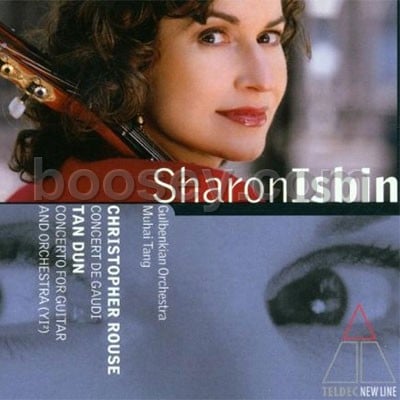2(II=picc).2.2.2-2.2.3.0-timp.perc(3):cast/chin.cym/sm wdbl/marimba/
tamb/tgl/TD/tam-t/ant.cym/xyl/BD/susp.cym/rute-harp-cel-strings
Abbreviations (PDF)
Boosey & Hawkes (Hendon Music)
I completed my Concert de Gaudí in Pittsford, New York on August 1, 1999. The work was a joint commission for guitarist Sharon Isbin from the Norddeutsche Rundfunk and the Dallas Symphony Orchestra, with additional funding provided by Richard and Jody Nordlof, to whom the work is dedicated.
In conceiving a guitar concerto, my thoughts went immediately to the great Spanish tradition of music for this instrument, and it seemed logical for me to reflect my admiration for this tradition in my own composition. This in turn led me to reflect upon the work of the extraordinary Catalonian architect Antoni Gaudí, hence the Catalan title for the piece. What has always struck me about Gaudí is his quintessentially Spanish combination of surrealism and mysticism, and I strove to include these elements in my concerto.
Towards this end, I used that music which almost everyone would recognize as archetypically Spanish—flamenco—as the foundation for the score. I then proceeded to "melt," "bend," "mist," and otherwise transform this material into something I hoped would be musically akin to the way Gaudí would take a traditional design and add fanciful and phantasmagoric touches to make it unlike any other's work. As a result, there is an intentionally "unfocused" quality about the musical language of my piece, which ranges from clear, traditional tonality to music of substantive dissonance. Changes of language are often abrupt and unexpected.
The structure of the concerto, on the other hand, is traditional, following the standard three-movement, fast-slow-fast, outline. For the most part, I was not trying to equate given sections of my work with specific buildings by Gaudí; the exception being parts of the slow movement, where I did on occasion visualize Gaudí's Cathedral of the Sagrada Familia while I was conceiving the music.
As much of my music has been concerned with issues of despair and darkness, I wanted in the Concert de Gaudí to compose a music that looked more towards the light, and it is therefore a score I intended to be more amiable and genial in character. It is scored for an orchestra consisting of two flutes (2nd doubling piccolo), two oboes, two clarinets, two bassoons, two horns, two trumpets, three trombones, harp, celesta, timpani, percussion (3 players) and strings. The percussion contingent includes tambourine, tenor drum, bass drum, castanets, suspended cymba1, Chinese cymbal, triangle, tam-tam, wood block, rute, xylophone, marimba, and antique cymbals. In performance, the concerto lasts approximately twenty-five minutes.
— Christopher Rouse
Reproduction Rights:
This program note may be reproduced free of charge in concert programs with a credit to the composer.
“Concert de Gaudí displayed the composer’s genius as an orchestral colorist.” —Register Guard

Sharon Isbin/Gulbenkian Orchestra/
Muhai Tang
Warner Classics 8573-81830-2
Buy this CD from Amazon

